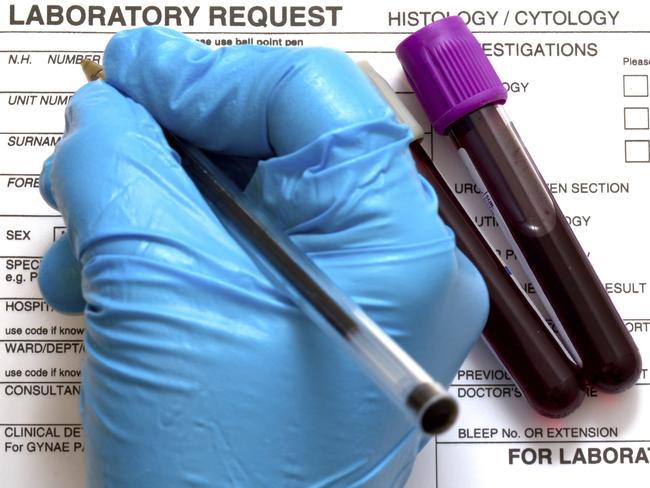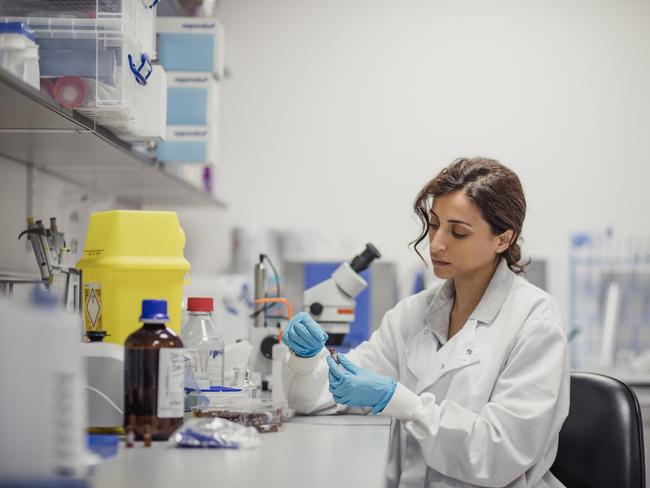Prostate cancer: New test that could save lives and prevent surgery
A groundbreaking new test for cancer could eliminate the need for surgery, as experts say too many men with low risk are unnecessarily going under the knife.
Exclusive: A revolutionary urine test has been developed that can accurately predict which men do and don’t need risky prostate cancer surgery.
Two in three men diagnosed with low risk prostate cancer currently choose not to have surgery and instead monitor the disease.
But experts hope to lift that level to 90 per cent, through the new urine test, which is still in development and not yet available in Australia.
Ultimately, the urine test could replace the sometimes unreliable PSA blood test currently used to identify men at risk of prostate cancer.
Researchers at the University of East Anglia and the Norfolk and Norwich University Hospital have developed the experimental new test called ‘PUR’ (Prostate Urine Risk) with funding from the Movember Foundation.

The researchers said if this test was to be used in the clinic, large numbers of men undertaking active monitoring of their disease could avoid an unnecessary initial biopsy and the repeated, invasive follow up testing.
MORE: Cancer-linked breast implants facing ban
MORE: Mum’s diet mistake linked to child allergies
MORE: What’s really going on inside your gut
This is because the test can identify men who are up to eight times less likely to need treatment within five years of diagnosis.
Dr Jeremy Clark from Norwich Medical School said the urine test could be used to not only diagnose prostate cancer without the need for an invasive needle biopsy but identify a patient’s level of risk.
“This means that we could predict whether or not prostate cancer patients already on active surveillance would require treatment,” he said.
“The really exciting thing is that the test predicted disease progression up to five years before it was detected by standard clinical methods,” he said.

Global director of biomedical research programs at the Movember Foundation Dr Mark Buzza said “the PUR test has enormous potential to transform the diagnosis and treatment of prostate cancer”.
President of the Urological Society of Australia and New Zealand (USANZ) Dr Peter Heathcote said too many men with low risk disease are still undergoing costly surgery they may not need.
The surgery or radiotherapy can put them at risk of life changing side effects including incontinence, infection and impotence.
There are also very high out of pocket medical expenses.
Around seven in ten men diagnosed with prostate cancer have low risk disease and are more likely to die with the cancer than of the cancer.
They can opt for active surveillance that involves a PSA blood test every 3-6 months and a repeat MRI and biopsy after 3-4 years to check whether the cancer has become more aggressive.
“In the past we didn’t do surveillance and all men were over treated, now we do less harm and we’ve gone from 100 per cent surgery to 70 per cent surveillance,” Dr Heathcote said.
“Ultimately we would like to get to 90 per cent surveillance,” he said.
The new test would need to undergo more large trials before it could be registered for use in Australia, Dr Heathcote said.

Retired Brisbane schoolteacher Bob Mitchell was diagnosed with prostate cancer in 2012 after he started getting up to go to the bathroom at night.
A biopsy showed the cancer was low grade and not aggressive and Mr Mitchell decided not to have surgery but elected for active surveillance instead.
“If you can get away without surgery that is preferable because there are issues if you have your prostate out,” the 70 year old grandfather said.
Under the monitoring system Mr Mitchell has regular PSA tests and a biopsy every three years to check whether the cancer has become more aggressive.
He cycles 40 kilometres three times a week and is planning trips to Antarctica and South America next year.
“I’ll probably die with prostate cancer not die of it,” he said.


